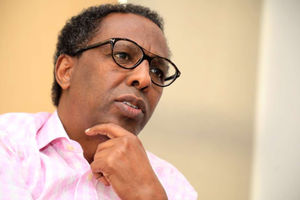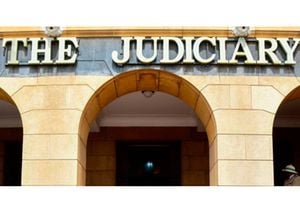
President William Ruto receives certificate from Chief Justice Martha Koome after taking oath of office on September 13, 2022.
There’s been a fever pitch national conversation – sometimes angry – about corruption, state capture, and judicial vice in the courts.
The current furore was stoked by President William Ruto who has been fuming for months about what he believes are indefensible court orders against his pet policy projects. Mr Ruto has been so incensed that more than once he’s declared he may not obey court orders, as the constitution commands him to do.
For many reasons, my advice to President Ruto is simple – don’t go there sir. Mr Ruto isn’t the only one aggrieved by our courts. We all know our courts are corrupt. That’s why we need an independent commission of inquiry to clean them up.
In 2022, we in Azimio la Umoja couldn’t believe the judgement of the Supreme Court finding in favour of Mr Ruto in the presidential election petition. Chief Justice Martha Koome, who was once a darling of civil society, used intemperate, injudicious, and contemptuous language to describe Azimio’s case.
CJ Koome mimicked a judge confronting the opposition in a repressive state – China, Iran, Nicaragua, Russia, take your pick from among the most autocratic. She snarled and cursed at Azimio. She fulminated. Her face, deportment, and body language said it all. I was left flabbergasted and mouth agape.
In the aftermath, Azimio released a scathing critique proving why the infamous screed of a judgement was itself unlawful and unconstitutional. But we all know there’s no appeal from a judgment of the Supreme Court.
The matter rested there. Even so, we called for the dismantling of the Court. Did the seven judges deserve to sit up there in their judicial “cassocks” dispensing injustice? Of course the Supreme bench wasn’t fired. But I knew sooner or later it would bite somewhere else because the monster had tasted blood. This is how we’ve arrived at this crossroads.
Let’s recall that part of Mr Ruto’s case against Azimio was the flat refusal – itself illegal and unconstitutional – by Jubilee’s Uhuru Kenyatta to elevate the seven judges of the High Court to the Court of Appeal as instructed by the Judicial Service Commission.
Mr Kenyatta's constitutional duty was to formally appoint the judges, not question their integrity. That ship sailed once the JSC recommended them. The President is heavily represented in the JSC where he should’ve presented his evidence to stop the elevation of the judges.
Mr Ruto rightly used this issue to push Mr Kenyatta – and by association Azimio – into an unpopular corner. Upon his ascension, he immediately made good on his promise and elevated the judges.
The upper echelons of the judiciary were ecstatic. CJ Koome could be seen in state functions with President Ruto having the time of her life. They say the mighty fall the hardest when they do. There’s a cohort of independent judges who are sticklers for the law and the constitution. This cohort cannot be controlled.
It’s these judges who have continually blocked the President’s policy initiatives when they haven’t passed constitutional muster. This is what has drawn the ire of Mr Ruto and soured relations with CJ Koome and the judiciary. President Ruto believes these judges are acting corruptly at the behest of powerful interests out to derail his agenda. Methinks he’s conflating two matters.
I don’t think the judges ruling against his policies have been bribed. I actually think those are some of the country’s finest legal minds. That said, President Ruto is right that many judges, magistrates and judicial officers are irredeemably corrupt.
It’s this rotten batch that Mr Ruto should help the country eradicate. I don’t believe the JSC or the courts themselves can clean up the rot. What we need is an independent, broadly legitimate commission of inquiry to investigate the ecosystem of corruption in the judiciary and make recommendations.
The remit of the commission of inquiry must be crafted in such a way that it doesn’t leave any loophole for political skullduggery. It must be empowered to receive public complaints about specific judges and judicial officers.
It must be mandated to investigate, demand, and receive all financial, property, and transactional records and histories of every judge and judicial officer to establish their assets, liabilities, and net worth whether in Kenya or abroad.
Those unwilling to provide this information should exit the judiciary and face legal consequences. These audits must be made public for everyone to see. Those who can’t explain their wealth must forfeit it, resign, or be prosecuted.
- Makau Mutua is SUNY Distinguished Professor and Margaret W. Wong Professor at Buffalo Law School, The State University of New York. @makaumutua.










